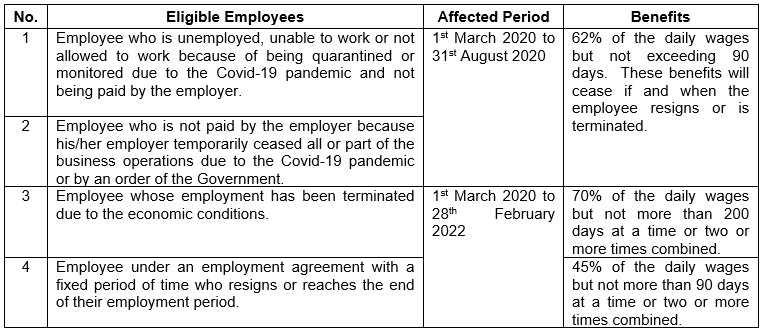1. Overview
In response to the COVID-19 pandemic, Thailand has imposed lockdown and social distancing measures nationwide. Staying home and working from home have been encouraged and supported by the Government and governors of provinces. In terms of legislative measures, the Thai Government has passed and implemented several laws and regulations to impose preventive sanctions and to grant and encourage financial, medical, moral and social support to the general public and businesses.
This article highlights some of the dozens of measures made to support investors, businesses and their employees affected by Covid-19 as of 30th April 2020.
2. Emergency Decree on E-Meetings
The Emergency Decree for Electronic Meetings B. E. 2563 (“ED on E-Meetings”) was passed by the Prime Minister of Thailand on 18th April 2020 and came into force from 19th April 2020. It allows the Annual General Meeting (AGM), the Extraordinary General Meeting (EGM) of shareholders and meetings of the Board of Directors (BOD) of companies be called and convened online without any physical attendance by the participating directors or shareholders. Prior to the ED on E-Meetings, for each online AGM, EGM and BOD meeting at least 1/3 of the participating shareholders or directors were required to be physically present at the same location in Thailand and all other participating directors or shareholders were required to be physically present at other locations in Thailand.
The key principles for e-meetings under the ED on E-Meetings are as follows:
1. The Chairman of the Board has discretion to call an e-meeting. A notice calling the e-meeting and supporting documents can be sent electronically. Their copies must be kept electronically or as printed copies.
2. Attendees must join the e-meeting online before the start of the meeting time.
3. Voting can be made on a disclosure basis or a confidential basis.
4. Minutes of the e-meeting must be prepared in writing.
5. The e-meeting must be recorded in full electronically as audio and/or video records, except for the portion of the e-meeting which is confidential.
6. The electronic traffic data of every attendee must be kept and it cannot be rejected as evidence in any court proceedings.
3. New E-Filing Initiatives of the Department of Business Development (“DBD”)
The DBD has adjusted its existing e-filing systems and introduced new e-filing initiatives to allow more practical online filings of documents by companies and other legal entities. Some of these adjustments and new measures are listed below.
1. Effective from 1st April 2020, the financial statements and copies of the list of shareholders of registered partnerships, private limited companies and public limited companies (where applicable)
Including copies of the annual report and the minutes of the annual general meeting of shareholders (“AGM”) of public limited companies can be filed with the DBD only through the DBD e-filing system.
2. Up to the extended deadline of 31st August 2020, any legal entity affected by the Covid-19 pandemic can convene its AGM after the applicable legal deadlines, provided that it submits to the DBD a clarification letter specifying the reasons for the late meeting at the same time when limited liability companies and public limited companies file its annual list of shareholders or when trade associations and chambers of commerce file its annual financial statements.
3. The deadline for registered partnerships, representative offices or branch offices of foreign legal entities operating businesses in Thailand and joint ventures with the financial year end falling between 31st October 2019 and 31st March 2020 to file financial statements with the DBD has been extended to 31st August 2020.
4. E-signatures can be used only for internal corporate documents. The DBD accepts only documents signed by wet signatures.
5. Registered partnerships and limited liability companies can apply for an account with the DBD e-registration system through the DBD website. Once authenticated by the DBD and other related authorities, the applicant will be given a username and a password to access the DBD e-registration system for online filing and online document obtaining with the DBD.
6. From 20th April 2020, legal entity registration affidavits and officially certified copies of documents filed with the DBD can be obtained only through the DBD e-registration system.
4. Benefits for Self-Insured Employees Affected by Covid-19
As of 17 April 2020, the Ministry of Labour issued two regulations to give financial benefits to self-insured employees who have been affected by the Covid-19 pandemic or the negative economic conditions. The benefits will be paid by the Social Security Fund. The two regulations are the Ministerial Regulations on (i) Unemployment Compensation Due to Force Majeure Caused by an Epidemic of Contagious Disease and (ii) Unemployment Compensation Due to the Impact from Economic Conditions. The major benefits are listed in the table below. Affected employees who are not self-insured with the Social Security Fund are given benefits under separate financial support measures.

5. New BOI Measures to Ease Covid-19 Impacts
The Board of Investment Thailand (BOI) has issued a series of measures to support BOI applicants and promoted projects affected by the Covid-19 pandemic and to boost the Thailand economy. Major measures are discussed below.
5.1 More Corporate Income Tax Reduction for Medical Equipment Manufacturing
The medical investment projects that manufacture medical equipment will be granted a 50% reduction of the corporate income tax (“CIT”) for 3 more years in addition to the original reduction period if the projects: (1) apply for promotion between 1st January 2020 to 30th June 2020, (2) start medical equipment production and generate income by 31st December 2020 and (3) sell and/or donate their medical equipment to recipients in Thailand at least 50% of their output in 2020 and 2021.
Any promoted business that changes its production line to include manufacturing of medical devices will be granted exemption of import duties for import of machinery if the application for production line adjustment is filed with the BOI within September 2020 and if the machinery is imported within 2020.
More tax benefits will be granted to projects that manufacture raw materials used in manufacturing medical products, e.g. an 8-year CIT exemption for production of pharmaceutical grade alcohol, expansion of CIT exemption for the production of non-woven fabrics used as raw materials for the production of medical masks or medical devices from 3 years to 5 years.
5.2 Temporary Relax of Investment Conditions
The deadlines for importation of machinery and the business operation commencement of the promoted projects falling between 1st January 2020 and 30th June 2020 have been extended for 6 months.
The operating promoted projects can file a request for a temporary closure of the project’s operation for more than 2 months. The BOI will grant or reject the request on a case-by-case basis.
5.3 Higher CIT Exemption Rate for Water Resource Management Projects
Investment projects that provide financial support to local holistic water resources management administrations against drought will be granted a CIT exemption or an additional CIT exemption for 3 years at the rate of 120% of the financial support amounts provided to the local administrations. The applications for the project promotion must be filed within 2021. The water management plan must be approved by the Office of the National Water Resources.
5.4 Broader Scope of R&D Activities
The scope of R&D activities eligible for exemption of import duties for import of raw materials for use in R&D activities has been broadened to cover other types of activities of projects, such as projects with conditions to also do R&D and projects that carry out R&D activities to increase efficiency.
5.5 CIT Exemption for 5 Years for Domestic Digital Platforms
Domestic digital platform development projects that do not have their own system and software design will be granted a CIT exemption for 5 years if their expenditure payable to domestic system and software design developers is not less than THB10 million.
Too see the archive of our past newsletters and articles please click here.
AUTHOR
 Senior Partner | bangkok
Senior Partner | bangkok Partner | bangkok
Partner | bangkok
The information provided in this document is general in nature and may not apply to any specific situation. Specific advice should be sought before taking any action based on the information provided. Under no circumstances shall LawPlus Ltd. and LawPlus Myanmar Ltd. or any of their directors, partners and lawyers be liable for any direct or indirect, incidental or consequential loss or damage that results from the use of or the reliance upon the information contained in this document. Copyright © 2016 to 2020 LawPlus Ltd.







